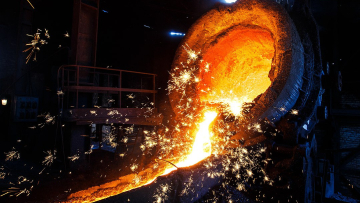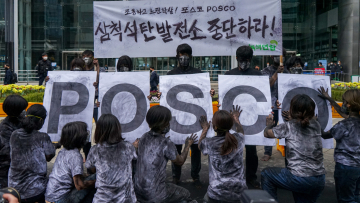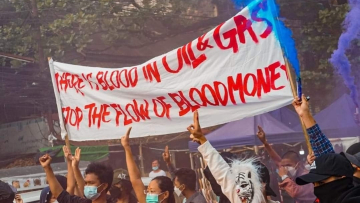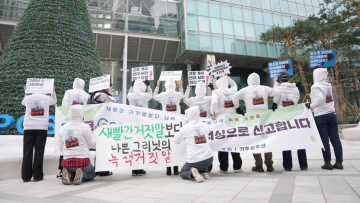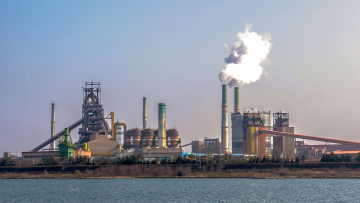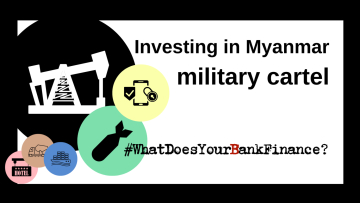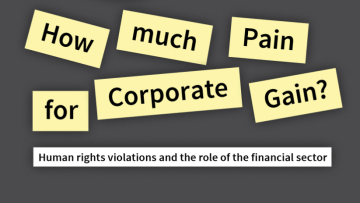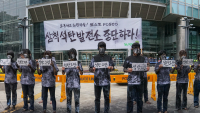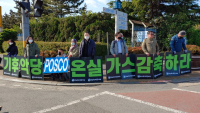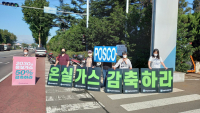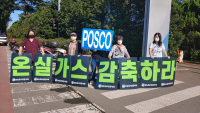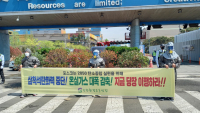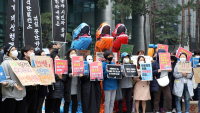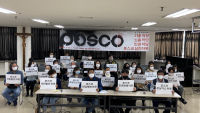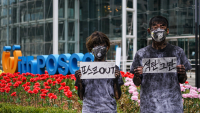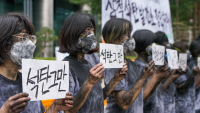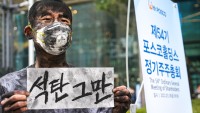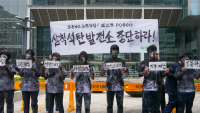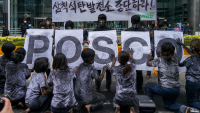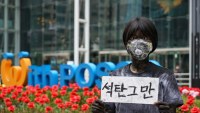Company – Active
This profile is actively maintainedJulia Hovenier, BankTrack
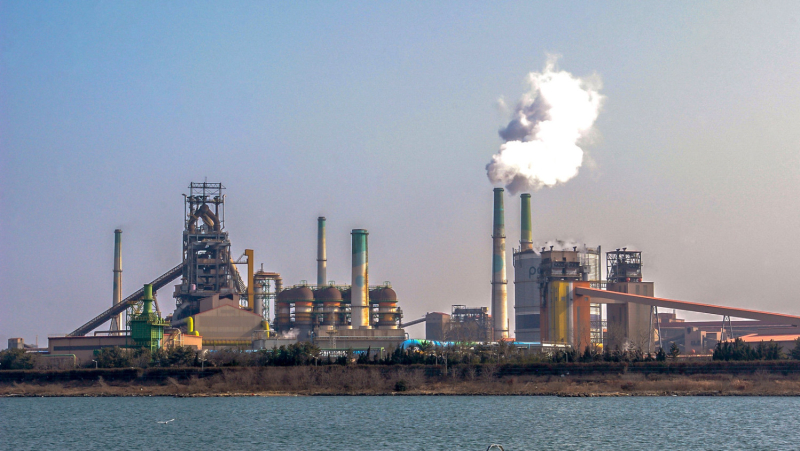
Company – Active
This profile is actively maintainedJulia Hovenier, BankTrack
Why this profile?
In South Korea and abroad, the steel giant POSCO is making communities sick with its pollution, fueling the climate catastrophe, and accelerating the destruction of critical nature. Local populations and our climate can’t afford the health and warming impacts of its coal-based steel production, fossil energy, or palm oil plantations any longer. POSCO is demonstrating a lack of committment to change by investing in the expanding the lifetime of three of its coal-fired furnaces in South Korea.
What must happen
Financial institutions providing finance or services to POSCO must engage with the company to ensure it respects human rights, and implements a credible transition plan to phase out fossil fuels in its domestic and overseas operations. In the short term, we are calling on banks to:
-
Require POSCO to publicly disclose a carbon emission reduction plan for Pohang Blast Furnace No. 4, which is currently undergoing relining.
-
Use their leverage as a financier of POSCO Holdings to increase pressure to cancel the planned relining of the Gwangyang Blast Furnace No. 2, and instead replace it with new, low-carbon facilities, while disclosing a clear emission reduction plan.
-
Call on POSCO Holdings to publicly disclose the phase-out plan for all its domestic and global blast furnace facilities, and release a facility-conversion plan to the hydrogen reduction process and scrap-based steel-making by electric arc furnace (EAF) in accordance with POSCO's carbon neutrality roadmap (10% reduction by 2030, 50% reduction by 2040, and net-zero by 2050).
In the absence of such plans, financiers should not provide future finance or services to POSCO.
| Sectors | Iron and Steel Manufacturing , Agriculture for Palm Oil, Coal Electric Power Generation, Oil and Gas Extraction |
| Headquarters |
|
| Ownership |
listed on Korea Exchange
The largest shareholders of POSCO Holdings are the National Pension Service of Korea (9.11%), BlackRock Fund Advisors (5.19%), and the Government of Singapore (4.67%). For a longer list, see POSCO Holdings 20-F filing, page 70. |
| Subsidiaries |
|
| Website | https://www.poscointl.com/eng/index.do |
Founded in 1967, the POSCO Group is a South Korean multinational conglomerate. It operates in 45 countries, and is the 7th largest steel producer in the world. While its primary operations are iron and steel production, since 2004 it has also been expanding into the energy and agricultural sectors, with a particular focus on coal-fired power, LNG, and palm oil.
Impact on human rights and communities
Fatal air pollution from steel manufacturing Manufacturing steel with coal generates significant amounts of pollution with detrimental health effects, ranging from cardiovascular diseases to lung cancer. A report by Solutions for Our Climate (SFOC) and the Centre for Research on Energy and Clean Air (CREA) estimated that 150 new cases of asthma and 60 preterm births occurred due to the pollution exposure in 2021 in South Korea. It also found that between 2022 and 2050 phasing coal out of steel production in South Korea could save over 9000 lives.
The study shows that air pollution from South Korea’s three coal-fired steel plants, two of which are operated by POSCO and one by Hyundai, could cause an estimated 19,400 premature deaths by 2050 under the current policy scenario. The report also found that POSCO Gwangyang, which is the largest integrated steelworks in the world, is the largest air pollutant emitter in South Korea and in the local province (taking up 54% of Jeonnam Province air pollutant emissions). POSCO Pohang is the highest air pollutant emitter in Gyeongbuk Province (83%), and the 2nd largest emitter in South Korea. Even though POSCO has invested USD 757 million since 2017 in mitigating its carcinogenic emissions, the amount of carcinogenic dust emitted by the company’s operations has increased each year since the investment.
Violating Indigenous rights in Indonesia POSCO International’s subsidiary, PT Bio Inti Agrindo (PT BIA), owns and operates a large palm oil plantation measuring 34,196 hectares (ha) in Papua, Indonesia. According to an OECD complaint filed against POSCO and its financiers by Korean and Indonesian civil society organisations, POSCO failed to implement free, prior and informed consent (FPIC), leaving the affected Indigenous communities without information or recourse. From the beginning of the plantation’s operations in 2011, PT BIA has not identified the customary land rights owners, consulted with them in a culturally appropriate manner, or provided them with adequate information about the project. Without FPIC, the company proceeded to clear 27,050 ha of rainforests and polluted the nearby Bian river, threatening the livelihoods and customs of the Indigenous peoples. As of May 2022, the villagers testify that POSCO International has not provided them with adequate access to grievance and remediation mechanisms. Many of the promises the company made upon its land-grabbing, like providing clean water, schools, and medical facilities, remain unfulfilled.
Ties to Myanmar Military Junta On February 1, 2021, Myanmar’s military attempted a coup to impose military rule, disregarding the November 2020 election results. Since then, resistance to the military regime has been met with mass arrests, indiscriminate attacks, airstrikes against civilians, and the targeting of the press. As of August 2023, 25,300 people have been arrested, 4,146 individuals have been killed, and more than 1.5 million civilians have been displaced by the terror campaign of the military junta. The Justice for Myanmar Coalition, Amnesty International, and the UN Fact Finding Mission on Myanmar have all identified POSCO as a close international business partner of the Myanmar military. It jointly owns the Shwe gas field in Myanmar, the biggest source of revenue for the junta, with the state-owned Myanma Oil and Gas Enterprise (MOGE). Profits from the military's business with POSCO are being used to finance the regional military commands and battalions carrying out atrocities.
Impact on climate
Locking in coal for steel In 2023, POSCO announced its decision to invest a total of around USD 393.63 million (519 billion Korean won) in extending the lifetime of two of its South Korean coal-based steel making facilities, Blast Furnace No. 4 in Pohang and Blast Furnace No. 2 in Gwangyang. Relining these two furnaces would lock in at least 199 Mt of CO2 in the next 17 years, equivalent to the entirety of the United Arab Emirates’ annual emissions in 2021. Blast furnaces, which burn coal and iron ore together in the steelmaking process, are the most carbon-intensive steel making technology. If the world is to remain under 1.5ºC, blast furnaces must be phased out as quickly as possible, especially in OECD countries like South Korea.
Contributing to climate chaos In 2021 International Energy Association explicitly said no new coal, oil or gas developments can take place if the world is to reach net zero by 2050. According to the 2023 Global Coal Exit list and 2022 Global Oil and Gas Exit List, POSCO is planning massive expansions of fossil fuel-based energy. It is planning new coal mines in Australia, new coal fired power plants in Korea and Bangladesh, and new gas fields in Myanmar.
Two POSCO subsidiaries (POSCO International and POSCO E&C) hold 34% of coal power developer Samcheok Blue Power, which is responsible for the construction of the last coal power plants of Korea, near the Maengbang beach. Its proposed coal plant is expected to release more than 13 million tons of greenhouse gasses every year. Additionally, POSCO International is ramping up its investments in the fossil gas production sector with the overarching goal of extending its presence across the global LNG value chain. In 2021, the company obtained exploration and development rights for the PM524 gas field in Malaysia and, more recently, expanded its reach by securing additional exploration rights for the Bunga offshore gas field in Indonesia. Additionally, POSCO International acquired the Australian gas company Senex Energy and has set ambitious targets for a significant expansion, aiming to triple its production capacity by the end of 2025.
Lack of transparency/ ambiguity in climate ambition In December 2020, POSCO announced a net zero by 2050 target, with an interim target of reducing its emissions 10% by 2030. But sometime between July and September 2023, without any official notice, POSCO updated its target to a 30% reduction by 2035, pushing back its ambitions by 5 years. In October, the POSCO has once again amended their Carbon Neutrality Roadmap, re-adding a target to reduce emissions by 'over 10%' by 2030. While this signals a positive increase in ambition, the ambiguous use of 10% 'plus delta' and the lack of press release explaining details of the change, remains concerning. This apparent change in climate ambitions without notifying shareholders and customers suggests that POSCO is not committed to robust decarbonisation, and that its shareholders should call for greater transparency.
Impact on nature and environment
Destroying the rainforests of Indonesian Papua POSCO deforested 27,050 ha of rainforest from 2011 to 2017 to develop palm oil plantations, 19,800 ha of which was primary forest (ancient and more biodiverse forests). Analyses indicated illegal use of fires to clear the concession, further damaging this important ecological region with its rich and unique biodiversity. POSCO International’s operation irreversibly converted the habitat for many endangered and threatened species. The company has not done any meaningful restoration in the wake of the damage it has caused, despite acquiring sustainability credentials such as RSPO and NDPE after the fact.
Contaminating the Amazon River Basin POSCO owns 20% of the Block 8 oil field in the Peruvian Amazon rainforest. Oil drilling in the Amazon basin severely degrades biodiversity and impinges on the lives of Indigenous Peoples who rely on the river and forest for their livelihoods. POSCO International was fined USD $1.87 million by the Peruvian government for the environmental damage done to the Amazon in the time that it operated there.
Since 2019, POSCO has been issuing ESG-linked bonds both in Europe and in the US under its Sustainable Finance Framework. So far it has raised nearly EUR 1.5 billion in ESG-linked bonds through two separate issuances in 2019 and 2021. The 2019 bond was arranged by HSBC, Bank of America Merrill Lynch, BNP Paribas, and Standard Chartered, and the 2020 bond was arranged by JP Morgan, BNP Paribas and HSBC. There are increasing concerns that ESG-linked financial products are not creating the positive impact that they claim.
Justice for Myanmar has mapped the flows of international bank and pension fund finance to POSCO’s activities in Myanmar, specifically citing Crédit Agricole and Första AP-fonden in their research.
According to its 2022 20-F filing, an annual reporting filing, (page F-86), POSCO has USD $8 billion in debt maturing in December 2023, from loans and bank overdrafts from HSBC and JPMorgan. Additionally, the filings cite Merill Lynch and the Export-Import Bank of Korea as financiers.
Additionally, a large number of banks underwrite POSCO’s operations. For a breakdown of which banks are underwriting which subsidiaries of POSCO, see below (or on pages F-133-134 of the 20F filing).
As of October 2023, at least 29 financial institutions have ruled out future finance for POSCO and its subsidiaries, including ANZ, Danske Bank, and Swedbank. POSCO has been excluded due to its climate impact from fossil fuel extraction & consumption, its weak labour standards and human rights abuses, and its biodiversity impacts.
Burning Paradise: One Year Later
Mighty and Korea Federation for Environmental Movements (KFEM) video showing how a year of citizen action around the world is creating pressure to stop the Korean-Indonesian conglomerate Korindo’s destruction of “the Land of the Tree Kangaroo”
Lost Papua, Last Papua: The Myth of Sustainable Palm Oil
Palm oil plantations are responsible for over 1 million football fields' worth of deforestation in Papua, Indonesia. Despite their branding as "sustainable," major global palm oil companies and their plantations continue to harm the lives of Papuans to this day. We visited Papua to speak with community members and activists about their experiences and how they are fighting back. Solutions for Our Climate (SFOC) is a South Korea-based NGO that advocates for stronger climate and energy policies.
Coal to clean: the health impacts of steelmaking
Transitioning steelmaking from coal to renewable-based technologies is key to preventing premature deaths from air pollution, especially for those in nearby communities. Last year, Centre for Research on Energy and Clean Air (CREA) and Solutions for Our Climate (?????) found that achieving carbon neutrality in steelmaking in South Korea by 2050 can avoid up to 10,000 premature deaths.
2025
2025-04-17 00:00:00 | POSCO sanctioned by Korean Fair Trade Commission for greenwashing
South Korea's Fair Trade Commission has called upon POSCO and POSCO Holdings to take down their misleading eco-friendly claims in its advertising following a complaint by Solutions for Our Climate. While still producing steel using carbon-intensive coal-fired blast furnaces and the mass-balance methodology, POSCO marketed its product under "eco-friendly" brands.
2025-02-27 00:00:00 | Youth take POSCO to court over Blast Furnace relining
Ten youths, aged 11 to 18, filed a civil lawsuit demanding that POSCO stop relining its Gwangyang No. 2 blast furnace.
2024
2024-12-17 00:00:00 | POSCO & JSW Steel sign an MOU to build a new steel plant in India
POSCO and JSW Steel have signed an MOU for the development of an integrated steel plant in India with an initial capacity of 5 million tonnes per annum. While the technology and the location of the steel plant are still unknown, POSCO's reentry into the Indian steel market is controversial. In 2013 POSCO sought to establish an integrated steel venture in India's eastern state of Odisha. It was meet with years of significant and sustained opposition from affected communities, who have used non-violent protest and democratic processes to resist their forced evictions from lands. In 2017, POSCO withdrew from the project, and the land was handed over by the Indian government to JSW Steel instead. The land was undisturbed by JSW Steel until 2022, when they began land clearing for the development of a new steel plant.



Video Volunteers.png&cropratio=16:9&width=190)

